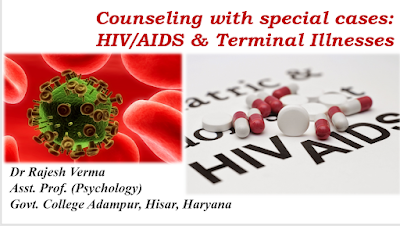HIV/AIDS and terminal illness
counselling is an active process of communication and dialogue between a trained
counsellor and the client who presents with problems related to HIV/AIDS or is
terminally and in a view to assist the client to deal with these problems
adequately and appropriately.
Broad Aims of
HIV/AIDS Counselling
1. Prevention of HIV transmission
Ø
Determining
whether the lifestyle of an individual places him or her at risk
Ø
Working
with an individual so that he or she understands the risks
Ø
Helping
to identify the meanings of high risk behaviour
Ø
Helping
to define the true potential for behaviour change
Ø
Working
with the individual to achieve and sustain behaviour change
2. Providing support to those affected
directly and indirectly by HIV.
Ø
Individual,
relationship, and family counselling to prevent and reduce psychological
morbidity associated with HIV infection and disease
Terminal
Illness
Terminal illness is used to describe
patients with advanced disease and a drastically reduced lifespan, with perhaps
months or weeks to live. Inevitably the range and
The
severity of physical symptoms will have increased, and will be having a
profound effect on how the patient lives his life.
Different
Psychological Responses to an HIV Positive Test Result.
Ø Shock - Recognition of mortality,
loss of hope for the future etc.
Ø Fear and anxiety - Lifelong
medication and treatment/treatment failure, isolation and abandonment and
social/sexual rejection, infecting others and being infected by them, partner’s
reaction etc.
Ø Depression - Adjustment to living
with a chronic viral condition, absence of a cure, limits imposed by possible
ill health, social, occupational, and sexual rejection if treatment fails etc.
Ø Anger and frustration - Adopt to new
and involuntary health/lifestyle restrictions, incorporating demanding drug
regimens, and possible side effects.
Ø Guilt is the result of interpreting
HIV as a punishment - for example, for being engaged in unprotected sex, using
drugs, and anxiety caused to the partner/family.
Best
Strategy to Deal with the Prevention of the Spread of HIV/AIDS
Behaviour
modification
Counselling
Suggestions to Counsellor of HIV/AIDs Patients
1. Counsellors should have deep knowledge
of HIV/AIDS (What it is, ways and means of spread, psycho-physio-socio
consequences of HIV infection and other relevant information.
2. Identify the cause of HIV/AIDS through
intensive and humane interaction with the patient.
3. Identify the present stage
[Asymptomatic, Symptomatic and End stage] in which the patient is.
4. Counsellor should clear all
misconceptions to the patient’s family members in the patient’s presence.
5. Open all communication channels with
patients regarding their conditions, and provide honest, factual information
about them.
6. Facilitate the expression of important
emotions and help patients learn to manage these emotions under the present
circumstances.
7. Initiate quality interaction between
patients and other significant people, such as family, friends, and medical
staff.
8. If possible, apply biofeedback and
self-hypnosis, which help control the distressing emotions of the patient.
9. Family therapy is one of the best tools
for HIV/AIDS, and terminally ill patients; it helps family members adjust to
the changes that the progression of a loved one’s illness has on the family
structure and dynamics. Hence, the counsellor is advised to apply it.
10. The counsellor should allow ventilation
of various feelings such as fear, anger, despair etc.
What
counsellor should know?
It is an organic fact that AIDS cannot be cured; the counsellor should
share coping strategies such as learning to live with the morbidity, adding
quality to life, extensive participation in discussion programs with
HIV-infected people, leaning towards spirituality, engaging in family and
social networks, use of technology to learn something new daily, use of
alternative therapies, strengthening self-control, self-suggestions through
constructive monologue, taking an active part in awareness campaigns, sharing
ordeal with fellow beings and narrative therapy, i.e. diary writing.
Counselling
Paradigms for Different Stages
Ø Asymptomatic stage - At this stage,
the counsellor must remember to treat the patient on food and nutrition,
support, and treatment with antiretroviral drugs prevention of onward
transmission.
Ø Symptomatic stage - At this stage,
the counsellor must remember to help the patient with the HIV-related
management of nutritional effects; treatment of HIV related infections, medical
care and psychological support.
Ø End of the life stage - In this
stage, the counsellor’s role is critical because the counsellor also helps the
patient and the family. As the patient and family are under depression and
grief. The counsellor should make the patient emotionally intense for the truth
(death) and prepare him for death by which he/she not only enables the family
to accept the fact of life and help the patient live the remaining life to the
fullest.
Common
Interventions
1. Help the client to learn healthy
communication and conflict resolution strategies (If you can solve a problem,
Why worry? Strategy).
2. Reduction of intensity and frequency of
expectations.
3. Identification of self-worth, focus on
growth, celebrate the success of growth, and move on.
4. Reframing perception (for example,
taking failure as an opportunity) helps in enhanced self-esteem and core
motivation.
Different
HIV Counselling Programs and Services
ü Counselling before the test is done
ü Counselling after the test for those
who are HIV positive and HIV negative
ü Risk reduction assessment to help
prevent transmission
ü Counselling after a diagnosis of HIV
disease has been made
ü Family and relationship counselling
ü Bereavement counselling
ü Telephone “hotline” counselling
ü Outreach counselling
ü Crisis intervention
ü Structured psychological support for
those affected by HIV
ü Support groups






No comments:
Post a Comment